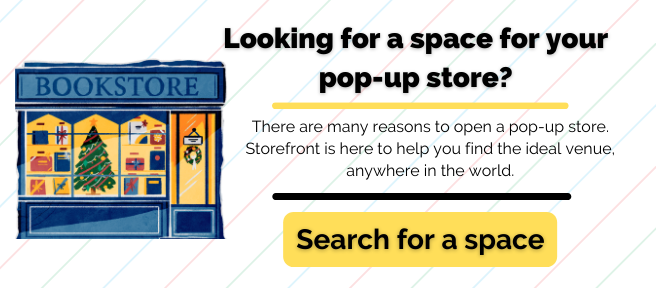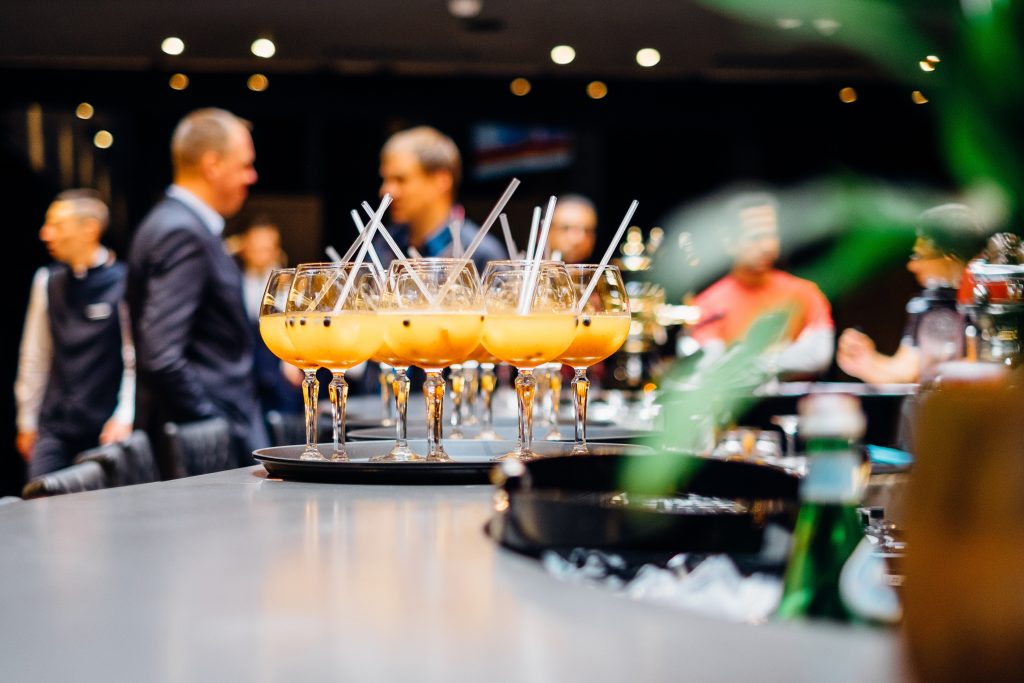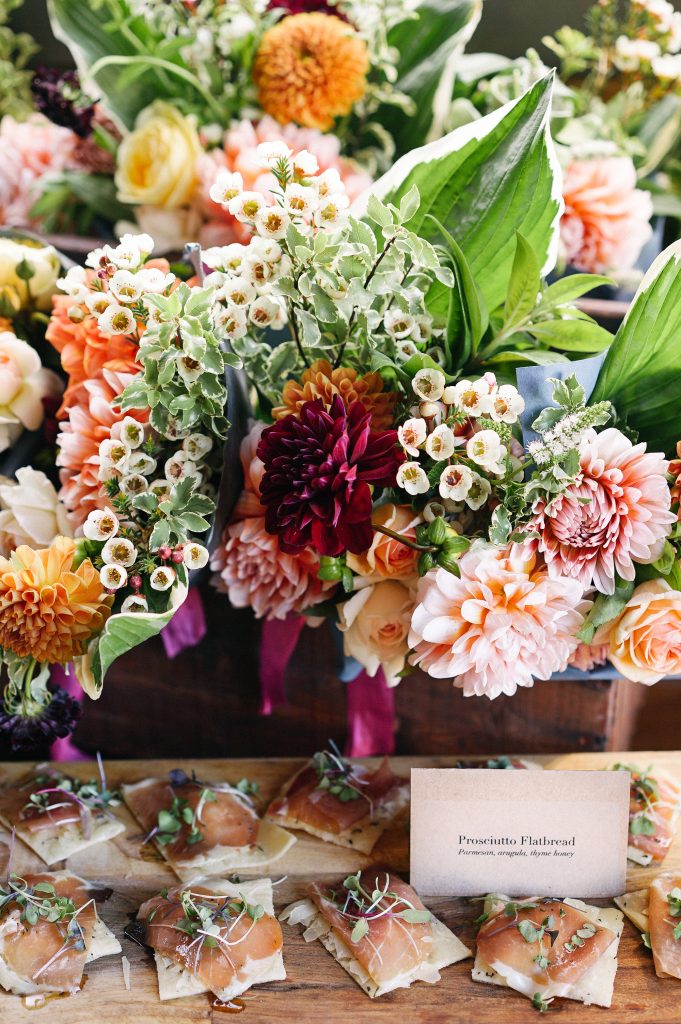You’re thinking of serving food or drink at your pop-up store, and your idea is validated by many a psychological study: Hunger is proven to increase shoppers’ likelihood of purchasing non-food items. And alcohol often widens wallets.
There’s a reason Costco is known for their samples and cafeterias. Experiential events and food pair perfectly; as renowned chef and hostess Julia Child once famously said, “A party without cake is just a meeting.”
However, before you open the doors to your pop-up store, you’ll need to make sure you’re serving food or drinks legally and safely. Whatever food or drink is present at your event needs to have been prepared in a facility and by a staff that meets regulations in your city, county and/or state. You want folks to shop, not drop!
3 Questions to Ask Before Starting
Before setting out about the logistics of serving food or drink at your pop-up store, it’s helpful to nail down the details. Regulations may vary depending on a number of factors, so get your ducks in a row first — ask yourself these three questions:
- How will we serve the refreshments?
Regardless of your brand, when you’re serving food or drinks prepared on the property of your establishment, you’re a restaurant in the law’s eyes. That means that in most cases, if you’re the liable entity preparing and serving food on a property, and you’re not hosting a private event like an opening night party, you’ll need to meet certain standards and pass inspection. This is just like any other restaurant, food truck or catering business, whether you’ll be selling food or offering it for free.
Important to note: According to many city guidelines, preparing food privately offsite is a no-go. Even buying pre-packaged croissants just to toast and butter at your store counts as food prep.
If you’re outsourcing to a caterer, consider how much space you’ll be able to give them to work. Though most caterers prepare food offsite, it may make more sense to prepare food on-site, in which case they’ll need an area to set up a “field kitchen,” writes Claire Lewis at Venuelust. Keep in mind that if you’re charging for refreshments but expecting fewer than 150 people, you may need to guarantee sales or pay a spot fee to secure a food vendor.
If you’re hiring caterers, ensure they’re licensed in the city your event is in for code compliance. You may want to start the search for a good caterer within your personal network, especially if you’re connected to any event professionals, who often have formal and information preferred vendors lists they’ve previously vetted and can recommend.
- Where will we serve the refreshments?
If you’re serving food inside your pop-up store, look at your floor plan sketches before planning your dream fondue buffet. Where will you serve guests? How will it complement the overall experience or increase engagement? Will you have places to sit, or tables where guests can rest food or drinks? Where will you place trash, recycling and/or compost receptacles? What’s your action plan for spills?
You don’t necessarily have to keep your refreshments inside. To celebrate their store opening in San Francisco, Everlane hosted Lady Falcon Coffee Club’s coffee truck outside of their shop, serving free drinks to guests. The truck was parked on the street outside of the storefront.
If you want to hire a food truck but can’t park it on private property, secure a special event parking permit from your city government or ask for a list of acceptable parking places from your county clerk.
- What type of food and drink will we serve?
There’s a chance you might not need to apply for a health permit or other licenses depending on what’s on the menu. For instance, temporary ice cream establishments may need a health permit due to the nature of preparing and serving frozen dairy products, whereas foods such as cotton candy, popcorn, funnel cakes and candied apples could be exempt. Check with your local regulatory organizations to be sure you are filing the correct applications.
Permits and Licenses
- Health Permits
“In general, anyone who manufactures, sells, or distributes products that can be consumed by humans […] need to have a health permit and an annual inspection,” writes Jean Murray for The Balance.
Also referred to as a health license or a food service license, health permits ensure your establishment is safe to prepare, store and dispose food products. They’re often administered at the city level, but you may need permits at the state level as well.
Check your lease to confirm water, electric and sewer utilities details, which health inspectors will need to know, and review your local department of health’s staff training requirements to apply for a permit. If your pop-up store rental isn’t outfitted with certain required amenities like a separate hand-washing station, your permit may be declined.
- Liquor Licenses
Liquor licenses are administered by your state’s Alcohol and Beverage Commission. Depending on the length and type of your pop-up store, you may qualify for a Limited Special Occasion permit for individuals or groups hosting functions (wedding receptions, company parties), or you can apply for a Retail Permit, which restaurants and bars have.
Many states also require liquor liability insurance if you’re selling alcohol on the premises.
Additional Considerations
- General Liability Insurance
General Liability Insurance, also known as Commercial General Business Liability, “protects a company’s assets and pays for obligations — medical costs, for example — incurred if someone gets hurt on your property or when there are property damages or injuries caused by you or your employees,” according to SBA.gov.
This coverage can prevent your company from major financial and legal issues. Check your lease and confirm with your landlord about who will be liable in the event of a food-related liability.
- Zoning
A factor in your permit applications, you’ll need to check with your county commissioner or other administrator about where you’re opening your pop-up store. Certain restrictions such as proximity to schools or churches can impact your permit approval.
- Hiring Food Prep Staff
Find qualified candidates with experience in the food service industry. Many cities require a certified manager to be present when staff is handling food, which you can obtain directly through the issuing agency or through a third-party online education service like ServSafe.
Next Steps
Now that you have a better idea of the permits and licenses you’ll need before you can serve food and drink at your pop-up store: Tally up the different expected fees and factor them into your budget, along with any staffing expenses. The food is a more obvious line item itself, but don’t forget that applying for state, county and city permits can add up.
Begin submitting necessary applications at least 30 days prior to your launch day, if not sooner, so all the paperwork and inspections can come through well before you open the doors. Commence the fun part: Menu planning or food truck taste-testing! Bon appétit!
Further Resources
State Retail and Food Service Codes and Regulations by State (FDA)
Directory of Local Health Departments (NACCHO)
Alcohol Beverage Authorities in United States (TTB)
Licenses and Permits for the Food Businesses (Quickbooks)
Opening a Restaurant (NYC.gov)
How to Open a Restaurant in California (Upcounsel)
ServSafe certification map (Third-party certification for food service)
Plan your next pop-up store with ease with the ultimate pop-up guide >
- How to Promote A Pop-Up Event on Social Media - July 17, 2018
- Photo Flip: 10 Unique San Francisco Pop-Up Spaces that Will Make Your Event Stand Out - July 6, 2018
- A Guide to Employee Training for Your Next Pop-Up Event - June 5, 2018











